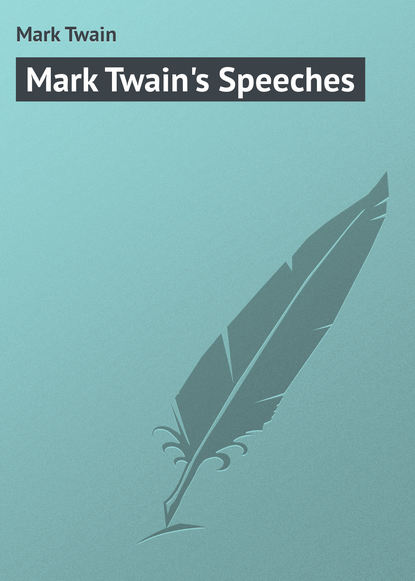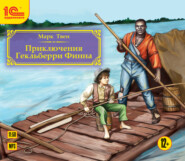По всем вопросам обращайтесь на: info@litportal.ru
(©) 2003-2025.
✖
Mark Twain's Speeches
Настройки чтения
Размер шрифта
Высота строк
Поля
I gave the manuscript back to him, and we started back to get an inquest.
At four o’clock in the morning, when we had gone to press and were having a relaxing concert as usual (for some of the printers were good singers and others good performers on the guitar and on that atrocity the accordion), the proprietor of the Union strode in and asked if anybody had heard anything of Boggs or the school report.
We stated the case, and all turned out to help hunt for the delinquent.
We found him standing on a table in a saloon, with an old tin lantern in one hand and the school report in the other, haranguing a gang of “corned” miners on, the iniquity of squandering the public money on education “when hundreds and hundreds of honest, hard-working men were literally starving for whiskey.”
He had been assisting in a regal spree with those parties for hours.
We dragged him away, and put him into bed.
Of course there was no school report in the Union, and Boggs held me accountable, though I was innocent of any intention or desire to compass its absence from that paper, and was as sorry as any one that the misfortune had occurred. But we were perfectly friendly.
The day the next school report was due the proprietor of the Tennessee Mine furnished us a buggy, and asked us to go down and write something about the property – a very common request, and one always gladly acceded to when people furnished buggies, for we were as fond of pleasure excursions as other people.
The “mine” was a hole in the ground ninety feet deep, and no way of getting down into it but by holding on to a rope and being lowered with a windlass.
The workmen had just gone off somewhere to dinner.
I was not strong enough to lower Boggs’s bulk, so I took an unlighted candle in my teeth, made a loop for my foot in the end of the rope, implored Boggs not to go to sleep or let the windlass get the start of him, and then swung out over the shaft.
I reached the bottom muddy and bruised about the elbows, but safe.
I lit the candle, made an examination of the rock, selected some specimens, and shouted to Boggs to hoist away.
No answer.
Presently a head appeared in the circle of daylight away aloft, and a voice came down:
“Are you all set?”
“All set-hoist away!”
“Are you comfortable?”
“Perfectly.”
“Could you wait a little?”
“Oh, certainly-no particular hurry.”
“Well-good-bye.”
“Why, where are you going?”
“After the school report!”
And he did.
I stayed down there an hour, and surprised the workmen when they hauled up and found a man on the rope instead of a bucket of rock.
I walked home, too – five miles-up-hill.
We had no school report next morning – but the Union had.
An Ideal French Address
Extract from “Paris notes,” In “Tom Sawyer abroad,” Etc.
I am told that a French sermon is like a French speech – it never names an historical event, but only the date of it; if you are not up in dates, you get left. A French speech is something like this:
“Comrades, citizens, brothers, noble parts of the only sublime and perfect nation, let us not forget that the 21st January cast off our chains; that the 10th August relieved us of the shameful presence of foreign spies; that the 5th September was its own justification before Heaven and humanity; that the 18th Brumaire contained the seeds of its own punishment; that the 14th July was the mighty voice of liberty proclaiming the resurrection, the new day, and inviting the oppressed peoples of the earth to look upon the divine face of France and live; and let us here record our everlasting curse against the man of the 2d December, and declare in thunder tones, the native tones of France, that but for him there had been no 17th Mardi in history, no 12th October, nor 9th January, no 22d April, no 16th November, no 30th September, no 2d July, no 14th February, no 29th June, no 15th August, no 31st May – that but for him, France, the pure, the grand, the peerless, had had a serene and vacant almanac to-day.”
I have heard of one French sermon which closed in this odd yet eloquent way:
“My hearers, we have sad cause to remember the man of the 13th January. The results of the vast crime of the 13th January have been in just proportion to the magnitude of the act itself. But for it there had been no 30th November – sorrowful spectacle! The grisly deed of the 16th June had not been done but for it, nor had the man of the 16th June known existence; to it alone the 3d September was due, also the fatal 12th October. Shall we, then, be grateful for the 13th January, with its freight of death for you and me and all that breathe? Yes, my friends, for it gave us also that which had never come but for it, and it alone – the blessed 25th December.”
It may be well enough to explain. The man of the 13th January is Adam; the crime of that date was the eating of the apple; the sorrowful spectacle of the 30th November was the expulsion from Eden; the grisly deed of the 16th June was the murder of Abel; the act of the 3d September was the beginning of the journey to the land of Nod; the 12th day of October, the last mountaintops disappeared under the flood. When you go to church in France, you want to take your almanac with you – annotated.
Statistics
Extract from “The history of the savage club”.
During that period of gloom when domestic bereavement had forced Mr. Clemens and his dear ones to secure the privacy they craved until their wounds should heal, his address was known to only a very few of his closest friends. One old friend in New York, after vain efforts to get his address, wrote him a letter addressed as follows
Mark Twain,
God Knows Where,
Try London.
The letter found him, and Mr. Clemens replied to the letter expressing himself surprised and complimented that the person who was credited with knowing his whereabouts should take so much interest in him, adding: “Had the letter been addressed to the care of the ‘other party,’ I would naturally have expected to receive it without delay.”
His correspondent tried again, and addressed the second letter:
Mark Twain,
The Devil Knows Where,
Try London.
This found him also no less promptly.
On June 9, 1899, he consented to visit the Savage Club, London, on condition that there was to be no publicity and no speech was to be expected from him. The toastmaster, in proposing the health of their guest, said that as a Scotchman, and therefore as a born expert, he thought Mark Twain had little or no claim to the title of humorist. Mr. Clemens had tried to be funny but had failed, and his true rôle in life was statistics; that he was a master of statistics, and loved them for their own sake, and it would be the easiest task he ever undertook if he would try to count all the real jokes he had ever made. While the toastmaster was speaking, the members saw Mr. Clemens’s eyes begin to sparkle and his cheeks to flush. He jumped up, and made a characteristic speech.
Perhaps I am not a humorist, but I am a first-class fool – a simpleton; for up to this moment I have believed Chairman MacAlister to be a decent person whom I could allow to mix up with my friends and relatives. The exhibition he has just made of himself reveals him to be a scoundrel and a knave of the deepest dye. I have been cruelly deceived, and it serves me right for trusting a Scotchman. Yes, I do understand figures, and I can count. I have counted the words in MacAlister’s drivel (I certainly cannot call it a speech), and there were exactly three thousand four hundred and thirty-nine. I also carefully counted the lies – there were exactly three thousand four hundred and thirty-nine. Therefore, I leave MacAlister to his fate.
I was sorry to have my name mentioned as one of the great authors, because they have a sad habit of dying off. Chaucer is dead, Spencer is dead, so is Milton, so is Shakespeare, and I am not feeling very well myself.
At four o’clock in the morning, when we had gone to press and were having a relaxing concert as usual (for some of the printers were good singers and others good performers on the guitar and on that atrocity the accordion), the proprietor of the Union strode in and asked if anybody had heard anything of Boggs or the school report.
We stated the case, and all turned out to help hunt for the delinquent.
We found him standing on a table in a saloon, with an old tin lantern in one hand and the school report in the other, haranguing a gang of “corned” miners on, the iniquity of squandering the public money on education “when hundreds and hundreds of honest, hard-working men were literally starving for whiskey.”
He had been assisting in a regal spree with those parties for hours.
We dragged him away, and put him into bed.
Of course there was no school report in the Union, and Boggs held me accountable, though I was innocent of any intention or desire to compass its absence from that paper, and was as sorry as any one that the misfortune had occurred. But we were perfectly friendly.
The day the next school report was due the proprietor of the Tennessee Mine furnished us a buggy, and asked us to go down and write something about the property – a very common request, and one always gladly acceded to when people furnished buggies, for we were as fond of pleasure excursions as other people.
The “mine” was a hole in the ground ninety feet deep, and no way of getting down into it but by holding on to a rope and being lowered with a windlass.
The workmen had just gone off somewhere to dinner.
I was not strong enough to lower Boggs’s bulk, so I took an unlighted candle in my teeth, made a loop for my foot in the end of the rope, implored Boggs not to go to sleep or let the windlass get the start of him, and then swung out over the shaft.
I reached the bottom muddy and bruised about the elbows, but safe.
I lit the candle, made an examination of the rock, selected some specimens, and shouted to Boggs to hoist away.
No answer.
Presently a head appeared in the circle of daylight away aloft, and a voice came down:
“Are you all set?”
“All set-hoist away!”
“Are you comfortable?”
“Perfectly.”
“Could you wait a little?”
“Oh, certainly-no particular hurry.”
“Well-good-bye.”
“Why, where are you going?”
“After the school report!”
And he did.
I stayed down there an hour, and surprised the workmen when they hauled up and found a man on the rope instead of a bucket of rock.
I walked home, too – five miles-up-hill.
We had no school report next morning – but the Union had.
An Ideal French Address
Extract from “Paris notes,” In “Tom Sawyer abroad,” Etc.
I am told that a French sermon is like a French speech – it never names an historical event, but only the date of it; if you are not up in dates, you get left. A French speech is something like this:
“Comrades, citizens, brothers, noble parts of the only sublime and perfect nation, let us not forget that the 21st January cast off our chains; that the 10th August relieved us of the shameful presence of foreign spies; that the 5th September was its own justification before Heaven and humanity; that the 18th Brumaire contained the seeds of its own punishment; that the 14th July was the mighty voice of liberty proclaiming the resurrection, the new day, and inviting the oppressed peoples of the earth to look upon the divine face of France and live; and let us here record our everlasting curse against the man of the 2d December, and declare in thunder tones, the native tones of France, that but for him there had been no 17th Mardi in history, no 12th October, nor 9th January, no 22d April, no 16th November, no 30th September, no 2d July, no 14th February, no 29th June, no 15th August, no 31st May – that but for him, France, the pure, the grand, the peerless, had had a serene and vacant almanac to-day.”
I have heard of one French sermon which closed in this odd yet eloquent way:
“My hearers, we have sad cause to remember the man of the 13th January. The results of the vast crime of the 13th January have been in just proportion to the magnitude of the act itself. But for it there had been no 30th November – sorrowful spectacle! The grisly deed of the 16th June had not been done but for it, nor had the man of the 16th June known existence; to it alone the 3d September was due, also the fatal 12th October. Shall we, then, be grateful for the 13th January, with its freight of death for you and me and all that breathe? Yes, my friends, for it gave us also that which had never come but for it, and it alone – the blessed 25th December.”
It may be well enough to explain. The man of the 13th January is Adam; the crime of that date was the eating of the apple; the sorrowful spectacle of the 30th November was the expulsion from Eden; the grisly deed of the 16th June was the murder of Abel; the act of the 3d September was the beginning of the journey to the land of Nod; the 12th day of October, the last mountaintops disappeared under the flood. When you go to church in France, you want to take your almanac with you – annotated.
Statistics
Extract from “The history of the savage club”.
During that period of gloom when domestic bereavement had forced Mr. Clemens and his dear ones to secure the privacy they craved until their wounds should heal, his address was known to only a very few of his closest friends. One old friend in New York, after vain efforts to get his address, wrote him a letter addressed as follows
Mark Twain,
God Knows Where,
Try London.
The letter found him, and Mr. Clemens replied to the letter expressing himself surprised and complimented that the person who was credited with knowing his whereabouts should take so much interest in him, adding: “Had the letter been addressed to the care of the ‘other party,’ I would naturally have expected to receive it without delay.”
His correspondent tried again, and addressed the second letter:
Mark Twain,
The Devil Knows Where,
Try London.
This found him also no less promptly.
On June 9, 1899, he consented to visit the Savage Club, London, on condition that there was to be no publicity and no speech was to be expected from him. The toastmaster, in proposing the health of their guest, said that as a Scotchman, and therefore as a born expert, he thought Mark Twain had little or no claim to the title of humorist. Mr. Clemens had tried to be funny but had failed, and his true rôle in life was statistics; that he was a master of statistics, and loved them for their own sake, and it would be the easiest task he ever undertook if he would try to count all the real jokes he had ever made. While the toastmaster was speaking, the members saw Mr. Clemens’s eyes begin to sparkle and his cheeks to flush. He jumped up, and made a characteristic speech.
Perhaps I am not a humorist, but I am a first-class fool – a simpleton; for up to this moment I have believed Chairman MacAlister to be a decent person whom I could allow to mix up with my friends and relatives. The exhibition he has just made of himself reveals him to be a scoundrel and a knave of the deepest dye. I have been cruelly deceived, and it serves me right for trusting a Scotchman. Yes, I do understand figures, and I can count. I have counted the words in MacAlister’s drivel (I certainly cannot call it a speech), and there were exactly three thousand four hundred and thirty-nine. I also carefully counted the lies – there were exactly three thousand four hundred and thirty-nine. Therefore, I leave MacAlister to his fate.
I was sorry to have my name mentioned as one of the great authors, because they have a sad habit of dying off. Chaucer is dead, Spencer is dead, so is Milton, so is Shakespeare, and I am not feeling very well myself.

















